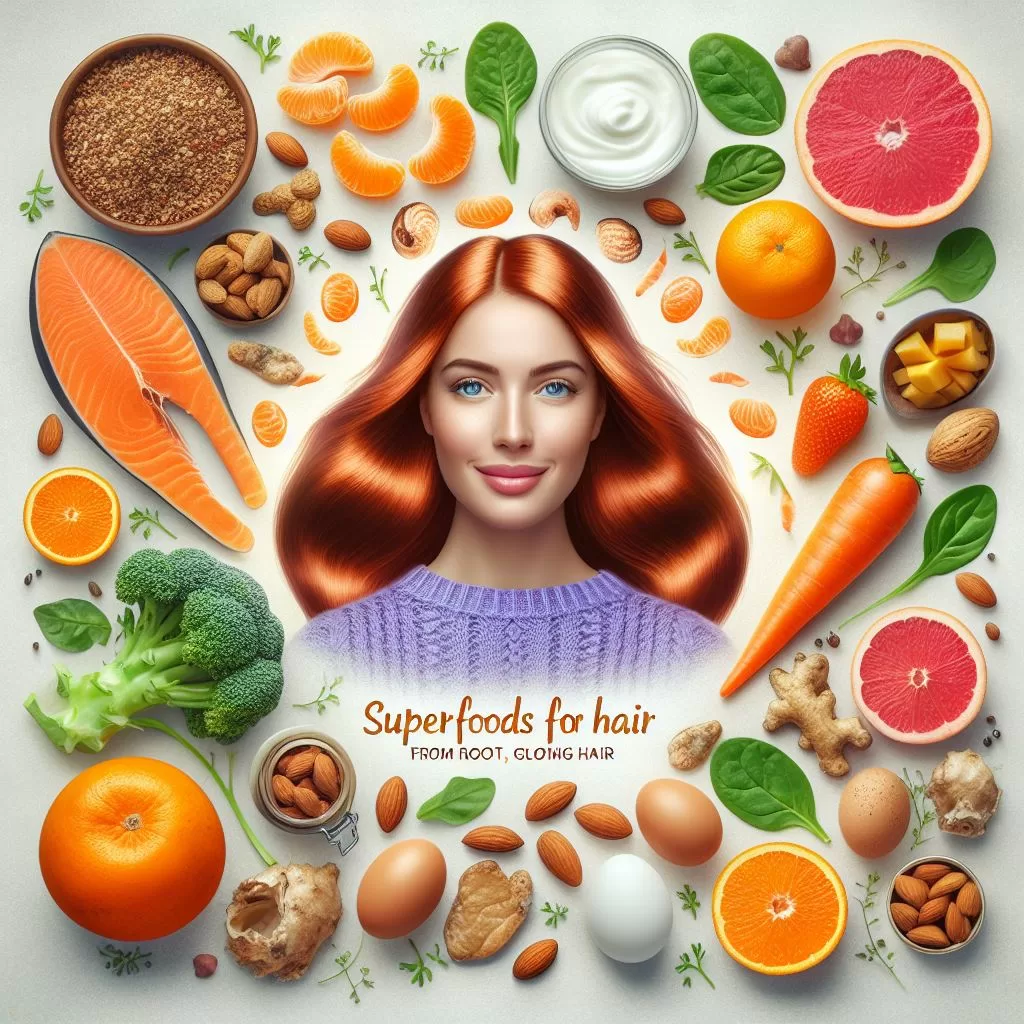In the infinite universe of foods beneficial to our health, some stand out for their remarkable effects on hair health. From colorful tubers to mineral-rich seafood, nature offers us a range of nutritional solutions to nourish, strengthen, and beautify our hair.
This article dives into the heart of the hidden benefits of certain foods on our hair. With a focus on superfoods such as sweet potato, spinach, salmon, tangerine, and almonds, as well as meats, poultry, Greek yogurt, eggs, and oysters, we will explore how their richness in essential nutrients, such as protein, biotin, zinc, and various vitamins, directly contributes to the promotion of healthy and vigorous hair. Join us on this nutritious journey to discover how incorporating these foods into your diet can transform your hair health.
I. Sweet Potato:

Sweet potato, this colorful and nutritious tuber, turns out to be a surprising ally for hair health. Its richness in beta-carotene, which is a precursor of vitamin A in our body, plays a central role in maintaining and promoting healthy and vigorous hair. Let’s explore in detail how the components of sweet potato work to strengthen hair, shedding light on the mechanisms of action of its nutrients.
1. Beta-carotene and Conversion to Vitamin A:
Beta-carotene is a natural pigment found abundantly in sweet potatoes, giving this vegetable its characteristic orange color. Once ingested, beta-carotene is converted by the body into vitamin A, a process essential for multiple bodily functions, including hair health.
2. Mechanism of action of Vitamin A on Hair:
– Regulation of sebum production:
Vitamin A plays a crucial role in regulating the sebaceous glands of the scalp. It helps produce healthy sebum, a natural oil that hydrates the scalp and keeps hair hydrated and shiny. Adequate sebum production is essential to prevent dry and brittle hair.
– Stimulation of hair growth:
Vitamin A is necessary for the growth of all cells, including hair cells. It helps make hair thicker and stronger by stimulating the production of hair cells. In addition, it plays a role in promoting blood circulation in the scalp, which promotes the delivery of nutrients to the roots of the hair, thus stimulating its growth.
3. Other Essential Nutrients in Sweet Potato:
Although beta-carotene is sweet potato’s key ingredient for hair health, this tuber is also rich in other beneficial nutrients:
– B group vitamins:
These vitamins play a role in the creation of red blood cells, which carry oxygen and nutrients to the scalp and hair follicles, essential for hair growth.
– Vitamin C and E:
Powerful antioxidants, they protect hair cells against damage caused by free radicals, thus promoting hair health and preventing premature aging.
– Minerals:
Iron, zinc, and copper, present in sweet potatoes, also play an important role in maintaining healthy hair. Iron helps fight anemia, a common cause of hair loss, while zinc and copper promote hair repair and growth.
Incorporating sweet potato into your diet can therefore be an effective strategy to strengthen the health of your hair. Thanks to its richness in beta-carotene and its ability to be converted into vitamin A, as well as its abundance of other vital nutrients, sweet potato supports hair growth, gives it shine, and contributes to a healthy scalp. healthy. Consuming this colorful and nutritious vegetable regularly is a simple and natural approach to promoting strong, healthy hair.
II. Spinach:

Spinach, this dark green leafy vegetable, is a powerhouse of essential nutrients, playing a crucial role in promoting healthy, strong hair. Their composition, rich in iron, folate, vitamins A and C, makes them a superfood for hair health. Let’s explore in-depth how these components work together to nourish hair from the inside out and stimulate hair growth.
1. Iron and Oxygen Transport:
Iron is a vital mineral for the proper functioning of the body, including hair health. It helps transport oxygen in the blood to the hair roots, a process essential for hair cell growth and repair.
– Mechanism of action of Iron on Hair:
▪︎Improved blood circulation: Good blood circulation in the scalp is crucial for healthy hair follicles. Iron improves this circulation, ensuring an adequate supply of oxygen and essential nutrients to the hair roots.
▪︎Prevention of anemia: Iron deficiency anemia is a common cause of hair loss. By maintaining adequate levels of iron in the diet, spinach helps prevent this condition, thereby promoting healthy hair growth.
2. Folate and Cellular Metabolism:
Folate, a B vitamin (B9), plays a key role in hair health through its involvement in cellular metabolism and the creation of new cells, including those of the hair and scalp.
– Mechanism of action of Folate on Hair:
▪︎DNA Synthesis: Folate is essential for DNA synthesis, which is crucial for hair cell division and growth.
▪︎Cell regeneration: By helping in the formation of red blood cells, folate contributes to the regeneration of cells, including those of the scalp and hair follicles, thereby supporting hair growth.
3. Vitamins A and C:
Antioxidants and Sebum Production Spinach is also rich in vitamins A and C, two nutrients with multiple benefits for hair.
– Mechanism of action of Vitamin A:
▪︎Regulation of sebum production: Vitamin A helps in the production of sebum, a natural oil that conditions the scalp and keeps hair hydrated. A well-hydrated scalp is less likely to experience dandruff and dryness problems.
– Mechanism of action of Vitamin C:
▪︎Collagen production: Vitamin C is involved in the production of collagen, an important protein for hair health because it strengthens the capillaries that supply hair follicles.
▪︎Protection against oxidative damage: As an antioxidant, vitamin C protects hair cells from damage caused by free radicals. This can help prevent premature graying of hair and maintain its health and vitality.
Including spinach in your diet offers a multitude of benefits for hair thanks to its rich content of essential nutrients. Iron, folate, and vitamins A and C work together to provide a strong foundation for hair growth, improving blood circulation and oxygen supply to the roots, stimulating the production of new hair cells, regulating hair production sebum, and protecting against oxidative damage. Consuming spinach regularly can therefore contribute to stronger, healthier, and shinier hair.
III. The salmon:
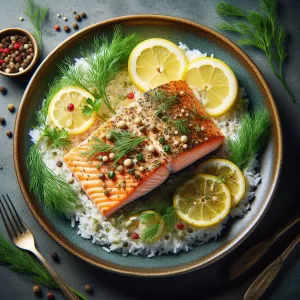
Salmon is known for its health benefits, particularly for the skin and hair. This oily fish is rich in essential nutrients that contribute to hair health, such as omega-3 fatty acids, protein, B vitamins, and selenium. Let’s find out how each of these components works to promote healthy, healthy hair.
1. Omega-3: Hydration and Growth.
Omega-3 fatty acids, abundant in salmon, play a crucial role in skin health, including that of the scalp. They contribute to hydration and the reduction of inflammation, two key factors for a healthy scalp and, by extension, hair growth.
– Mechanism of action of Omega-3:
▪︎Scalp hydration: Omega-3 helps keep the scalp hydrated, which is essential for avoiding dryness and dandruff, conditions that can inhibit hair growth.
▪︎Reduction of inflammation: By decreasing inflammation around hair follicles, omega-3 promotes a healthier environment for hair growth.
2. Proteins: Structure and Repair.
Salmon is also an excellent source of protein, the main component of hair. Protein is essential for repairing and building new tissues, including hair.
– Mechanism of action of Proteins:
▪︎Hair strengthening: Protein provides the building blocks needed to strengthen hair, making it less likely to break and damage.
▪︎Growth stimulation: A diet rich in protein supports hair growth by providing the nutrients needed to form new hair.
3. Vitamin B: Energy and Growth.
B vitamins, particularly biotin (vitamin B7), are known for their role in hair health. They help convert food into energy, which is crucial for hair growth.
– Mechanism of action of Vitamin B:
▪︎Energy metabolism: B vitamins support cellular metabolism, including that of hair cells, by helping to produce energy from food.
▪︎Hair follicle health: A diet rich in B vitamins can improve the health of hair follicles, thereby reducing hair loss.
4. Selenium: Antioxidant Protection.
Selenium, a mineral found in salmon, plays an important role in protecting cells from oxidative damage through its antioxidant properties.
– Mechanism of action of Selenium:
▪︎Protection against free radicals: Selenium helps protect hair cells from free radical damage, which can help prevent premature graying of hair.
▪︎Scalp health: By contributing to a healthy scalp, selenium can prevent problems such as dryness and dandruff, promoting an optimal environment for hair growth.
Including salmon in your diet can have significant benefits on hair health. Thanks to its richness in omega-3, protein, B vitamins, and selenium, salmon promotes scalp hydration, repair and strengthening of hair, energy production for hair growth, and protection against oxidative damage.
IV. Tangerine:

Tangerine, also known as mandarin, is a juicy and sweet citrus fruit that has many health benefits, including hair. Its richness in vitamin C makes it a valuable ally for promoting healthy, healthy hair. However, the benefits of tangerine for hair don’t stop at its vitamin C content; let’s explore in detail the mechanisms of action of its components.
1. Vitamin C: Antioxidant and Collagen Stimulator.
Vitamin C is a powerful antioxidant that plays a key role in hair health. It helps fight free radical damage, which can weaken hair and slow its growth.
– Mechanism of action of Vitamin C:
▪︎Stimulation of collagen production: Collagen is a vital protein for hair structure. Vitamin C is essential for the synthesis of collagen, thereby strengthening the strength and elasticity of hair. Sufficient vitamin C intake can therefore contribute to stronger hair that is less likely to break.
▪︎Improved iron absorption: Vitamin C facilitates the absorption of iron, a crucial nutrient for hair growth. Iron plays an important role in the production of hemoglobin, which carries oxygen to hair cells, promoting their growth and repair.
2. Other Essential Nutrients in Tangerines:
Tangerines also provide other beneficial nutrients for hair, although vitamin C is the most notable component.
– Vitamin A:
Tangerine contains vitamin A, which helps regulate sebum production on the scalp. A well-hydrated scalp is crucial for maintaining healthy hair and avoiding dryness and dandruff problems.
– B group vitamins:
These vitamins, present in small quantities in tangerines, are important for maintaining good hair health. They help form red blood cells, which carry oxygen and nutrients to the scalp and hair follicles.
– Minerals:
Tangerines provide minerals like potassium and magnesium, which support overall scalp health and can help prevent hair loss.
Incorporating tangerines into your diet is a delicious and natural way to support your hair health. With their high vitamin C content, they help protect hair against oxidative damage, stimulate collagen production for strong, resilient hair, and improve iron absorption, promoting hair growth. The other vitamins and minerals found in tangerines also contribute to hair health, making this fruit a great addition to a balanced diet for healthy, vibrant hair.
V. Almonds:
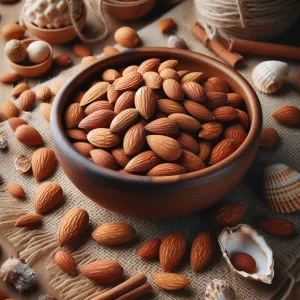
Almonds, these tasty and nutritious little nuts, are more than just a snack. They are full of components beneficial for hair health, including biotin, but also other essential nutrients which together contribute to the growth and health of hair. Let’s dive into the details of these mechanisms of action that make almonds a superfood for your hair.
1. Biotin (Vitamin B7): The Super Nutrient for Hair Growth.
Biotin, often associated with healthy hair, nails, and skin, is abundant in almonds. This B vitamin plays a crucial role in converting food into energy and in the metabolism of proteins, fats, and carbohydrates, which are essential for hair cell growth.
– Mechanism of action of Biotin:
▪︎Stimulation of hair growth: Biotin contributes to the production of keratin, a protein that makes up the majority of hair. Sufficient biotin intake can therefore improve hair density and texture, making hair thicker and stronger.
▪︎Reduction of hair loss: By strengthening the keratin in the hair fiber, biotin can help reduce hair loss and stimulate the regrowth of stronger, healthier hair.
2. Other Essential Nutrients in Almonds:
Almonds are not only a good source of biotin; they also contain other nutrients that support hair health.
– Vitamin E:
A powerful antioxidant, vitamin E in almonds helps protect hair cells from damage caused by free radicals. This can help prevent premature graying of hair and promote healthy growth.
– Omega-3 and omega-6 fatty acids:
These essential fatty acids, found in small amounts in almonds, are known to improve scalp health by reducing inflammation and nourishing hair follicles, thereby promoting fuller, stronger hair.
– Magnesium and zinc:
Magnesium supports follicular health, while zinc plays a role in repairing hair tissue and maintaining the production of oil glands around follicles, essential for hair growth.
Incorporating almonds into your diet can be beneficial for your hair, thanks to the richness and diversity of their nutrients. Biotin stimulates keratin production for stronger, thicker hair, while the vitamins, minerals, and essential fatty acids it contains support overall hair health by nourishing the scalp, protecting hair cells from oxidative damage, and promoting healthy hair growth. Almonds are therefore more than just a snack; they are a real hair health booster, promising not only to delight your taste buds but also to contribute to healthy, glowing hair.
VI. Meat and Poultry:
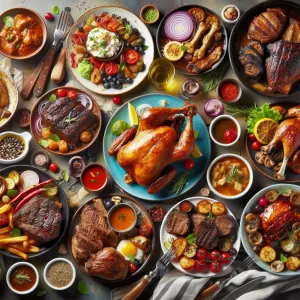
Meat and poultry are a primary source of high-quality protein, essential for hair health and resilience. However, their contribution to hair health goes far beyond just providing protein. These foods provide an array of nutrients that work synergistically to nourish and strengthen hair from the inside out. Let’s find out in detail how the different components of meat and poultry promote healthy and vigorous hair.
1. Proteins: Foundation of Hair Structure.
Hair is composed primarily of keratin, a fibrous protein that gives it strength and elasticity. Proteins obtained from meats and poultry provide the amino acids necessary for the production of keratin, thus playing a direct role in building and maintaining hair structure.
– Mechanism of action of Proteins:
▪︎Synthesis of Keratin: Essential amino acids, such as methionine and cysteine, are precursors to keratin. A diet rich in protein ensures an adequate supply of these amino acids, thereby promoting the growth of strong and healthy hair.
▪︎Hair Repair: Hair damage caused by environmental factors or chemical treatments can be repaired with proteins, which strengthen the hair shaft and reduce breakage.
2. Iron: Oxygenation and Hair Growth.
Iron is a key mineral found in red meats and poultry. It plays a vital role in transporting oxygen to hair cells, promoting healthy growth, and preventing hair loss.
– Mechanism of action of Iron:
▪︎Transport of Oxygen: Iron is an essential component of hemoglobin, the protein in red blood cells responsible for transporting oxygen. A sufficient iron intake ensures good oxygenation of the scalp and hair follicles, thus promoting their growth and regeneration.
▪︎Prevention of Iron Deficiency Anemia: Anemia due to iron deficiency can lead to hair loss. Consuming meat and poultry, which are rich in heme iron, which is easily absorbed by the body, can help prevent this condition.
3. B Complex Vitamins: Energy and Regeneration.
Meats and poultry are rich sources of B vitamins, including B12, niacin (B3), biotin (B7), and pantothenic acid (B5), which play various roles in hair health.
– Mechanism of action of B vitamins:
▪︎Energy Metabolism: B vitamins are essential for converting food into energy and necessary for hair cell metabolism. They support hair growth by providing the energy required for cell regeneration.
▪︎Scalp Health: Niacin (B3) improves blood circulation in the scalp, while biotin (B7) is known for its role in hair growth and preventing hair loss. Vitamin B12 is crucial for the formation of red blood cells, thus contributing to better oxygenation of hair cells.
Incorporating meat and poultry into your diet is strategic for maintaining healthy and strong hair. Their richness in high-quality protein, iron, and B-complex vitamins, among other nutrients, provides comprehensive support for hair growth, damage repair, and hair loss prevention.
VII. Greek Yogurt:
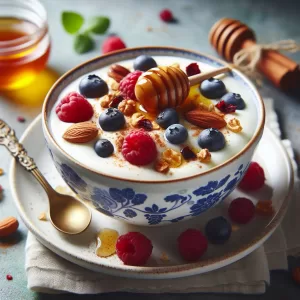
Greek yogurt is an exceptionally nutritious food, famous for its benefits for digestive health, its high protein content, and its beneficial role for skin and hair. Its nutrient-rich composition makes it a valuable ally for maintaining healthy hair. Let’s take a detailed look at how the components of Greek yogurt work to nourish hair and stimulate hair growth.
1. Vitamin B5 (Pantothenic Acid): Circulation and Growth.
Vitamin B5, or pantothenic acid, plays a vital role in hair health. It is known to promote blood circulation to the scalp, which is essential for nourishing hair follicles and stimulating hair growth.
– Mechanism of action of Vitamin B5:
▪︎Improved Blood Circulation: Vitamin B5 helps dilate blood vessels in the scalp, improving the delivery of oxygen and essential nutrients to hair follicles. This improvement in blood circulation promotes hair health and stimulates hair growth.
▪︎Strengthening Hair Roots: By nourishing hair follicles, vitamin B5 strengthens hair roots, thereby reducing hair loss and promoting healthy growth.
2. Proteins: Structure and Repair.
Greek yogurt is particularly rich in protein, making it beneficial for hair health. Protein is essential for repairing hair tissue and providing the structure needed for strong, resilient hair.
-Mechanism of action of Proteins:
▪︎Repair of Damaged Hair: The proteins in Greek yogurt help repair damage to hair caused by chemical treatments, heat, and environmental stress. They help restore the strength and elasticity of the hair.
▪︎Strengthening the Hair Fiber: Protein intake supports the structure of keratin, the main protein in hair, which helps prevent breakage and makes hair stronger and thicker.
3. Natural Conditioning:
In addition to its nutrients, Greek yogurt is an excellent natural conditioner for hair. Its rich, creamy texture helps hydrate and smooth hair, leaving it soft and shiny.
– Mechanism of action of Conditioning:
▪︎Hydration: The lipids found in Greek yogurt nourish the scalp and hair, providing deep hydration that fights dryness and frizz.
▪︎Cuticle Smoothing: Applying Greek yogurt to hair can help smooth cuticles, making hair more manageable, soft to the touch, and shiny.
Incorporating Greek yogurt into your diet or hair care routine can provide remarkable hair health benefits. Thanks to its richness in vitamin B5, and proteins, and its natural conditioning properties, Greek yogurt promotes better blood circulation to the scalp, stimulates hair growth, repairs damage, and deeply hydrates the hair. Whether consumed or applied directly to the hair, Greek yogurt is a superfood for healthy, strong, and glowing hair.
VIII. Eggs:
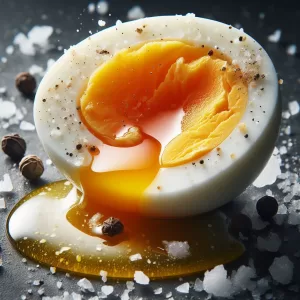
Eggs are considered a superfood for hair, thanks to their richness in essential nutrients such as complete proteins, biotin, selenium, and zinc. These components play a crucial role in maintaining and promoting healthy, healthy hair. Let’s find out in detail how each element contained in eggs contributes to hair health.
1. Complete Proteins: Repair and Strength.
Eggs are an exceptional source of complete protein, providing all the essential amino acids needed by the body. These proteins are fundamental to hair health, as they constitute the main structure of the hair fiber.
– Mechanism of action of Proteins:
▪︎Repair of Damaged Hair: Proteins help repair damage to hair due to chemical treatments, heat, and environmental stresses, rebuilding hair structure from the inside out.
▪︎Hair Strengthening: Protein intake supports keratin, making hair stronger and less likely to break.
2. Biotin: Growth and Vitality.
Biotin, or vitamin B7, is essential for hair health. It plays a key role in the metabolism of proteins, fats, and carbohydrates, which directly influences hair growth and quality.
– Mechanism of action of Biotin:
▪︎Stimulation of Hair Growth: Biotin contributes to the production of keratin, thereby promoting rapid hair growth and increasing hair density.
▪︎Hair Loss Prevention: Adequate biotin intake can help prevent hair loss, by strengthening the root and hair shaft.
3. Selenium and Zinc: Protection and Regulation.
Selenium and zinc are two minerals found in eggs that provide significant benefits for hair health.
– Mechanism of action of Selenium:
▪︎Antioxidant Protection: Selenium helps protect hair cells from oxidative damage caused by free radicals, supporting scalp health.
▪︎Support for Thyroid Function: Optimal thyroid function, supported by selenium, is crucial for hair growth and preventing hair loss.
-Mechanism of action of Zinc:
▪︎Regulation of Sebum Production: Zinc helps regulate sebum production in the scalp, preventing excess oil that can clog follicles and lead to hair loss.
▪︎Hair Repair and Growth: Zinc is essential for repairing hair tissue and maintaining the oil glands that surround the follicles, promoting healthy hair growth.
4. Other Essential Minerals:
In addition to selenium and zinc, eggs contain other essential minerals like iron, which play a role in transporting oxygen to hair cells and support hair growth.
Eggs offer a powerful combination of essential nutrients for hair health. Complete proteins, biotin, selenium, zinc, and other minerals work together to repair, strengthen, and stimulate hair growth while protecting the scalp from environmental damage. Incorporating eggs into your diet or using them in hair treatments can be an effective way to nourish your hair from the inside and out, promoting healthy hair.
IX. Oysters:

Oysters are recognized not only for their culinary refinement but also for their incredible health benefits, particularly for hair health. Rich in zinc, they constitute a real treasure to fight against hair loss and promote their growth. However, zinc is not the only component of oysters beneficial to hair; Let’s explore in detail the mechanisms of action of each nutrient found in oysters that contribute to hair health.
1. Zinc: Hair Repair and Growth.
Zinc plays a fundamental role in many biological processes, including the growth and repair of hair tissue, as well as the optimal functioning of the sebaceous glands of the scalp.
– Mechanism of action of Zinc:
▪︎Regulation of Sebum Production: Zinc helps maintain hormonal balance and regulates the production of sebum, the scalp’s natural oil, thereby preventing dandruff and excess sebum that can lead to clogged follicles and hair loss.
▪︎Support for Cellular Repair: As a co-factor for many enzymes, zinc is essential for cell repair and tissue growth, including hair. Sufficient zinc intake can therefore accelerate the regeneration of hair cells and encourage healthy hair growth.
▪︎Prevention of Hair Loss: Zinc plays a role in protein synthesis and the formation of keratin, a key component of hair. Zinc deficiency can lead to hair loss; therefore, consuming oysters can help prevent this problem.
2. Other Nutrients in Oysters Beneficial for Hair:
Oysters also provide other essential nutrients that contribute to hair health.
-Proteins:
Oysters are a good source of high-quality protein, essential for building keratin. Protein helps strengthen hair, reduce breakage, and encourage growth.
– Iron:
They also contain iron, which helps improve blood circulation to the scalp, carrying oxygen and essential nutrients to the hair follicles, which is crucial for hair growth.
– B group vitamins:
Oysters are rich in certain B vitamins, including B12, which support hair health by improving oxygenation and helping with the formation of red blood cells. This contributes to better nutrition and healthier hair growth.
Incorporating oysters into your diet offers a multitude of hair health benefits. Their high zinc content regulates sebum production, supports cellular repair, and prevents hair loss, while proteins, iron, and B vitamins help to strengthen, nourish, and stimulate hair growth. Oysters are not just a gastronomic delight; they are also a superfood for healthy, strong, and vibrant hair.
Conclusion :
Through this in-depth look at the key foods for healthy-looking hair, it becomes clear that our diet plays a major role in the health of our hair. Sweet potato, spinach, salmon, tangerine, almonds, meats, poultry, Greek yogurt, eggs, and oysters are not only delicious components of a balanced diet; they are also the guardians of our hair health, providing an arsenal of essential nutrients to stimulate growth, strengthen structure, and improve the shine of our hair. Incorporating these superfoods into our daily lives is not only a step towards a healthier diet, but it is also an effective strategy for sporting strong, resilient, and shiny hair. So, nourishing our hair starts on our plate, and through this awareness, we can all aim for optimal hair health.

